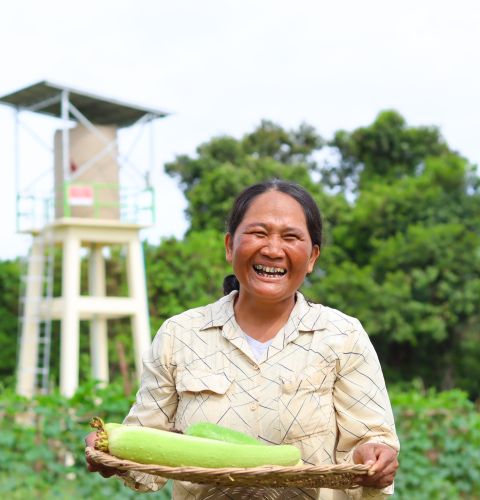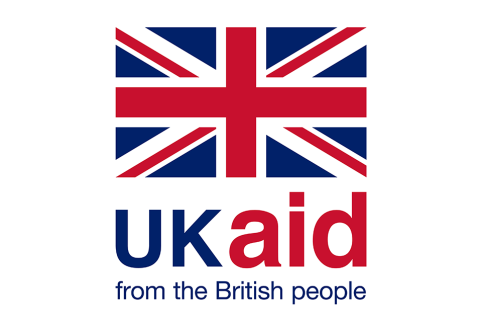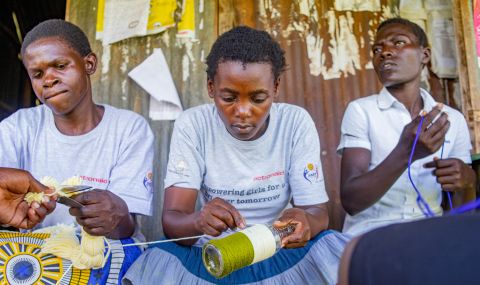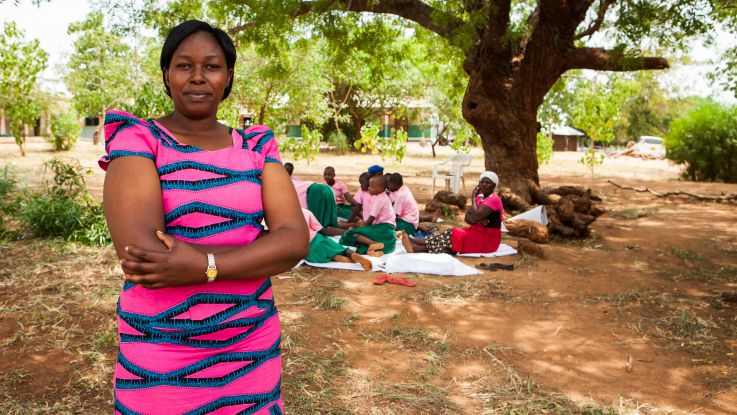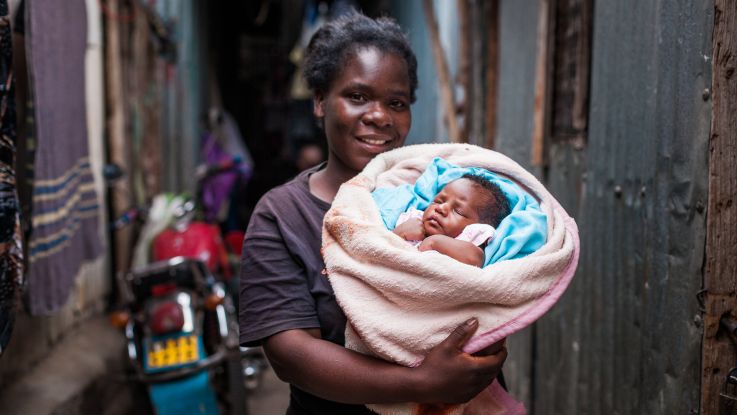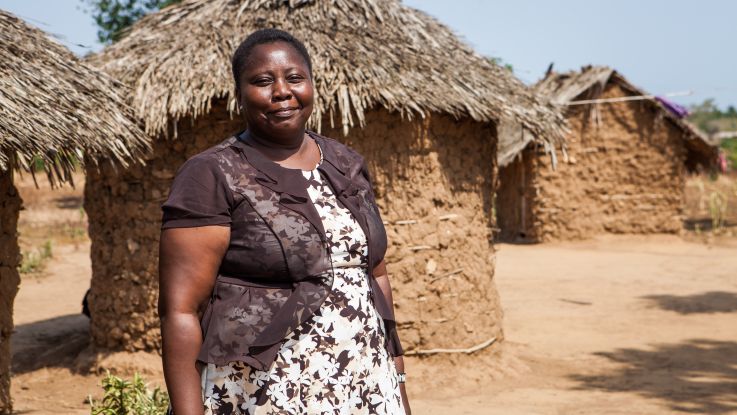She is the Answer : UK Aid Match appeal 2021
£2.26m
was raised to help women fight against climate change
53,688
people were reached directly with the campaign
60,000
community members benefited indirectly from this project
Where was the funding used?
The funds supported a three-year project called the Women-Led Alternatives to Climate Change in Cambodia (WLACC) project in Cambodia, which has now reached its end.
We focused this appeal on Cambodia because the 2017 Climate Change Vulnerability Index ranked Cambodia between “High” and “Extreme Risk,” meaning that climate change impacts will most likely lead to more floods, more drought, and less availability of drinking water.
ActionAid also has a strong network of communities in Cambodia that it works with. We have established relationships providing a solid foundation on which to further build and expand our transformational programmes that urgently needed funding.
What did we achieve with this project?
- We have reached over 53,000 people directly including women champions; small holder farmers; and community members especially those most vulnerable or living in extreme poverty.
- We have worked with four Women Champion Networks in Cambodia (WCN). We reached 117 women champions and their communities. Women Champions Network (WCNs) played a pivotal role in supporting community livelihoods and resilience and conserving natural resources.
- All four WCNs worked to mobilise resources in order for the networks to sustain themselves financially after the close of the project. Initiatives included a rice bank, coconut husk fertiliser business, a market, a nursery for trees and plants and savings groups.
- The project indirectly benefitted more than 60,000 people who accessed the benefits of the initiatives without project funding in some way – whether from improvements made to infrastructure or services by the WCNs or as a result of WCN advocacy.
- In summary the project has broadly met the targets it had set, and in many cases overachieved against these targets, while also ensuring a higher representation of women.
What was the impact of the project?
Better prepared for disasters
As a direct result of the actions taken by the Women Champions Networks, women champions observed that their communities have increased their disaster preparedness and resilience.
For example, farmers received training to understand how to select the right seeds for extreme weather and are now using natural fertilisers, people in the community have more awareness of reducing risk of disasters, WASH and health issues, and more local authorities have disaster risk reduction plans in place which include measures for preparedness, prevention and recovery.
Improved infrastructure
There have also been improvements to physical infrastructure – for example new roads were constructed and existing roads which were damaged by floods have been rehabilitated; the number of wells has increased; canals have been rehabilitated to prepare for upcoming drought; and school yards have been rehabilitated to protect children from dangers during floods. Safer school routes boosted girls’ education access.
Innovative initiatives
The "Kampot Resilient Market" is an initiative set up by the Kampot Women Champion Network as a result of this project. The market focuses on sustainable livelihoods and economic empowerment for women in Kampot by promoting local farmers' produce such as rice, vegetables, chicken and duck and fishery products such as fresh seafood and processed sea food (dry-shrimp and dry-fish). Some of the income of this market also contributes towards better climate adaptation work.
A social enterprise producing organic fertilisers and building nurseries for mangroves, young plants and flowers was also set up.
In Pursat, the WCN has a savings group with 36 members and they have been using some of their income to support their small businesses, which include raising pigs, farming and selling food.
Advocacy activities
The WCNs carried out advocacy activities with the authorities to improve services, with issues raised successfully included in community investment plans and raised awareness amongst community members and local authorities on issues related to gender and domestic violence, health and more.
Practicing climate-resilient farming
Over 5,000 farmers and fisherfolk were trained in agroecology and sustainable fishing practices. The funds supported farmers in purchasing drought-resistant seeds, constructing water harvesting systems, or investing in organic fertilisers.
Women empowered: Su Ramyan’s journey to sustainable livelihood
In the quiet village of Ta Dep, Kampot province, 37-year-old Su Ramyan lives with her young son, carrying the weight of their household with no stable income. During the Covid-19 pandemic her chickens died and Ramyan struggled to afford food and education for her son, surviving on small loans and family support.
Her turning point came when she was selected as a farmer under the Women-Led Alternatives to Climate Change in Cambodia (WLACC) project—implemented by the Children and Women Development Center in Cambodia (CWDCC) and ActionAid Cambodia, with local support from the Women Champions Network in Kampot.
Through the programme, Ramyan received hands-on training in climate-resilient, natural chicken farming. She learned how to select chicken breeds based on market demand, produce natural, nutritious feed, treat diseases with herbal remedies and build climate-resilient coops.
Alongside knowledge, the project also equipped her with chickens, breeding tools, and materials to build a sturdy coop. Regular support from Women Champion and CWDCC staff helped her overcome each challenge.
“When I joined the project, I found hope again,” Ramyan says with a smile. “Now I raise chickens more easily, and when I have problems, there’s always someone to help.”
Today, her income has grown fivefold with better farming methods and promotional materials provided by the project, customers now come directly to her home to buy chickens.Her story is a powerful reminder of how women-led, climate-resilient farming can create lasting change. Su Ramyan is not only feeding her family—she’s inspiring a community.
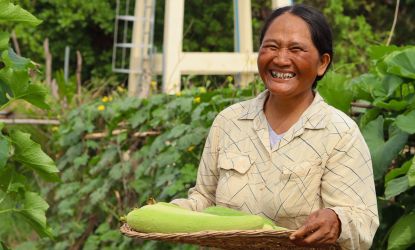
Turning lives around: Natt's journey as a farmer
In Ta Treal village, Kampong Thom province, 48-year-old Natt has long faced the harsh realities of climate change. A mother of three, she relied on traditional farming to support her family—until disaster struck.
In 2011, a devastating flood destroyed nearly one hectare of her crops. Natt and her family tried to divert the rising water, but relentless rains left them helpless. The aftermath pushed the family into deep debt and made it difficult to afford her children’s education.
The challenges didn’t stop there. The following year brought scorching droughts that further reduced their yields. Her husband turned to construction work but eventually fell ill, leaving Natt solely responsible for farming, childcare, and household income.
Hope arrived in 2022 when Natt was selected as a farmer in the Women-Led Alternatives for Climate Change in Cambodia project, led by the Cooperation for Alleviation of Poverty (COFAP) in partnership with the Women Champion Network. She received hands-on training in agroecology, learning to produce natural compost and fertilisers, use organic pesticides, implement cover crop conservation techniques and visit and learn from successful eco-farms.
Today, Natt earns a daily income from selling vegetables. A solar-powered water pump system—provided through the project—now reduces costs and boosts productivity while enhancing safety and environmental sustainability.
“This support changed our lives,” she says proudly. “My eldest daughter is now a teacher, the second is in university, and my youngest is finishing high school. We finally have stability.”
Natt's journey is a powerful example of how climate-resilient, women-led solutions can build stronger, more sustainable communities.
Page updated 16 July 2025
